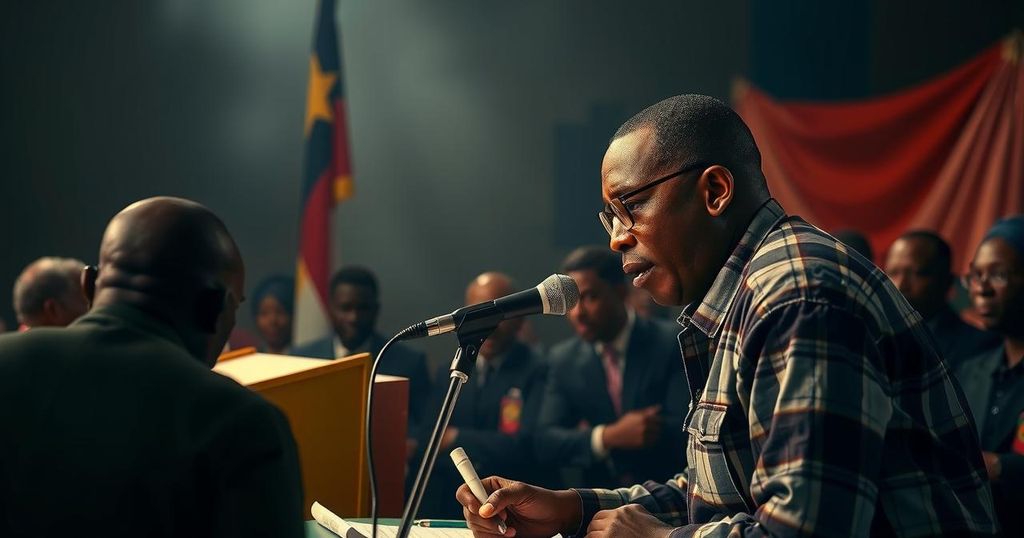World news
ACCRA, AFRICA, BEDIAKO, CHEDDAR, DEMOCRACY, ELECTORAL PROCESS, GHANA, GOVERNANCE, GOVERNMENT, JOHN TADEN, LOS ANGELES, MAHAMUDU BAWUMIA, NATIONAL DEMOCRATIC CONGRESS, NEW PATRIOTIC PARTY, NORTH AMERICA, NPP NDC, OPPOSITION, PEPPERDINE UNIVERSITY, POLITICS, UNITED STATES, UNIVERSITY OF GHANA, VOA
Fatima Khan
0 Comments
Ghana’s Competitive Elections: Mahama Challenges Bawumia Amid Economic Woes
Ghana’s upcoming presidential election on December 7 features former President John Mahama challenging incumbent Vice President Mahamudu Bawumia in a highly competitive setting. Key issues include economic recovery from a $30 billion debt default, inflation, and illegal mining. While many voters express a desire for change, others support Bawumia’s digitization policies. The election outcome is expected to significantly influence the nation’s trajectory.
Ghana is poised for a highly competitive election on December 7, with former President John Mahama of the National Democratic Congress (NDC) challenging the ruling party candidate, Mahamudu Bawumia, who currently serves as vice president. Mahama aims to foster a 24-hour economy to generate jobs and supports an economic recovery following a significant debt default in 2022. On the other hand, Bawumia emphasizes his commitment to strengthening the economy amidst post-pandemic challenges.
Since the inception of constitutional governance in 1992, Ghana has predominantly alternated between the NDC and the New Patriotic Party (NPP). Kwame Asah Asante, a senior lecturer at the University of Ghana, indicates that this pattern is likely to persist, noting that minor parties have historically garnered less than 5% of the total vote. However, he acknowledges that should these parties achieve even a slight increase in support, they might catalyze a runoff election.
In the bustling streets of Accra, numerous candidate billboards reflect the diverse political landscape, inciting excitement among voters. Some citizens express a desire for change, articulating their frustration with the long-standing dominance of the major parties. Angela Ofori, an undecided voter, remarked, “Since 1992 to this year, we haven’t changed parties … we want [to] change to [a] different party so that we would see more improvements.”
One notable independent candidate is Nana Kwame Bediako, also known as Cheddar, whose campaign focuses on eco-friendly policies and enhancing citizens’ everyday experiences. Although his popularity resonates with the youth, experts predict that he may struggle to exert significant influence on the overall election results, potentially only drawing enough votes to instigate a runoff.
The Ghanaian economy is under significant stress, exacerbated by a $30 billion external debt default in 2022. A combination of factors, including the COVID-19 pandemic and the global grain supply disruption due to the war in Ukraine, has further strained the nation’s resources. According to Asante, voters are primarily concerned about economic stability, deeming it a crucial issue that could sway the elections in favor of change.
Infrastructure, health, education, corruption, and unemployment rank among other vital issues highlighted in this election cycle. However, sentiments surrounding inflation and economic hardship resonate strongly among the electorate; with inflation peaking at an unprecedented 54% over the past 18 months, dissatisfaction with the government is palpable.
Moreover, illegal mining, or “galamsay,” poses a grave threat to both agricultural land and the cocoa production that is vital to Ghana’s economy. This situation has prompted some voters, such as Wisdom Gavor and Janet Bawah, to reject the incumbent government in favor of Mahama’s proposed economic reforms. Gavor emphasized the potential job creation stemming from Mahama’s vision, asserting, “If the 24-hour economy comes, it’s going to be three shifts.” Bawah articulated a common frustration, stating, “The suffering is too much for us … the price is different every day.”
Conversely, supporters of Bawumia laud his advancements in digitizing Ghana’s economy, which have reportedly contributed to job creation and improvements in government efficiency. NPP voter Ivan Duke commended, “One policy I am very happy about is the digitization policy…” This sentiment is echoed by political analyst John Taden, who acknowledged Bawumia’s successful initiatives, dubbing him “Mr. Digital” due to his technology-oriented reforms.
Ghana is recognized as a stable democracy relative to other regional frameworks, yet the forthcoming elections are anticipated to be exceptionally competitive, with the potential to lead to a significant change in governance.
The electoral landscape in Ghana is currently dominated by two political entities, the National Democratic Congress (NDC) and the New Patriotic Party (NPP), both of which have been alternately governing the country since 1992. The upcoming national elections are particularly significant as they come in the wake of hardships, including a $30 billion debt default attributed to extensive borrowing and the economic fallout from the COVID-19 pandemic. Voter sentiments indicate a growing desire for change, especially among demographics frustrated with economic hardships and traditional political allegiances. Amidst this, several independent candidates are emerging, attempting to resonate with voters, especially the youth.
As Ghana approaches its highly competitive elections on December 7, the political atmosphere is charged with a mix of enthusiasm and apprehension among voters. With critical issues such as economic recovery, inflation, and illegal mining dominating the discourse, candidates are offering varied proposals to engage the electorate. Former President John Mahama presents a transformative vision for a 24-hour economy, while Vice President Mahamudu Bawumia touts his digitization policies. Voter dynamics suggest a potential shift in political allegiance, although historical patterns may favor the traditional power-holding parties. Thus, the election outcome remains uncertain, promising a significant impact on Ghana’s future direction.
Original Source: www.voanews.com




Post Comment